
Do You Get a Black Moon?
What is a Black Moon, and why does it happen in December?
On Eid al-Adha, Muslims demonstrate their obedience to Allah by sacrificing an animal. The holiday is inspired by a story from the Quran that is also known to Christians and Jews.

Sheep are among the animals sacrificed on Eid al-Adha.
©iStockphoto.com/oyaboya
The Quran tells the story of the prophet Ibrahim who Allah (God) commands to kill his son, Ismail, to prove his obedience. As Ibrahim prepares for the sacrifice, Allah replaces Ismail with a ram to be slaughtered in his stead.
Eid al-Adha, the Feast of Sacrifice, is a commemoration of Ibrahim’s act of obedience and his willingness to follow God’s command without question.
Despite its pious origins, Eid al-Adha is, first and foremost, a big celebration. People dress in their finest garments, often having bought new clothes for the occasion, and meet with family and friends to celebrate together.
Although Eid al-Adha traditions vary from country to country, there are some common elements:
The day usually starts with communal prayer (Eid Salaah). Muslims congregate at the local mosque after sunrise to say special Eid prayers and hear a sermon.
Following the prayer, people wish each other Eid Mubarak, meaning Happy Eid or Blessed Eid. They may embrace each other and exchange small gifts.
Do you want to wish someone Happy Eid, but you’re not a Muslim? Don’t be shy! Eid is a day of goodwill and respect, so wishing someone Eid Mubarak or Happy Eid will most likely at least earn you a smile, if not an invitation to a lavish Eid feast.
In commemoration of the story of Ibrahim and Ismail, Muslims around the world sacrifice animals on Eid al-Adha in a tradition called Qurbani. Many millions of animals are slaughtered on this day: according to estimates by the Pakistan Tanners Association, around 8 million animals are sacrificed each year in Pakistan alone.
While some criticize the bloodshed, and tabloid media regularly capitalize on images of dead animals and blood running down the streets, it’s worth putting this figure into perspective: 25 million animals are slaughtered in the United States every day of the year, and an average American eats more than six times as much meat as an average Pakistani.
The rules tied to Qurbani are strict and manifold. Examples include:
The meat is to be divided into three equal parts. One portion is donated to those in need, and the second portion is given to friends. The third portion is kept for one’s own consumption, and it typically forms part of the Eid feast enjoyed with family and friends.
Sharing and charity play an important role on Eid, and many people give money to charitable causes on this day, in addition to sharing the meat of the slaughtered animal with people in need.
In fact, although Eid al-Adha involves actual animal sacrifice, the underlying meaning of the holiday is based on a more symbolic and selfless interpretation of the concept: Muslim tradition encourages sacrificing your personal desires and sharing your wealth with those less fortunate—in other words: giving up something you hold dear, just like Ibrahim demonstrated when he showed himself willing to sacrifice his own beloved son.
A lavish meal is another integral part of this Muslim holiday. Since many traditional Eid al-Adha dishes are savory, it is sometimes referred to as the salty Eid—in contrast to Eid al-Fitr, which is called the “sweet Eid” or “Sugar Feast.”
Naturally, the meat from the sacrificed animal plays a central role in Eid al-Adha cuisine. Examples from around the world include:
 India:
India: Syria:
Syria: Morocco:
Morocco:Eid al-Adha falls on the 10th day of Dhu al-Hijjah, the twelfth and final month in the Islamic lunar calendar.
The observance is preceded by Arafat Day (or Day of Arafah), and it lasts for up to four days.
The first day of Eid al-Adha falls on the third day of the Hajj, the annual pilgrimage to Mecca in Saudi Arabia, the central holy site of Islam. The Hajj pilgrimage is one of the Five Pillars of Islam, the most important religious duties any Muslim is expected to perform.
The other Eid celebration, Eid al-Fitr, is also linked to one of the Five Pillars: coming at the end of Ramadan, it brings to a close the month-long Ramadan fast.
Predicting the date of Islamic holidays is a tricky business. The Muslim calendar is a lunar calendar where a new month begins with a confirmed sighting of the Crescent Moon. This makes it impossible to predict the exact date of Eid al-Adha. What’s more, the date can vary from country to country because there are several different interpretations of what constitutes a confirmed sighting.
Our holiday pages have up-to-date information for countries worldwide.
Scholars generally agree that Prophet Muhammad introduced the feast, although the timing is debated. According to some traditions, he initiated both Eid al-Adha and Eid al-Fitr after his journey (Hijrah) from Mecca to Medina in 622 CE.
The story of Ibrahim (Abraham) and his willingness to sacrifice his beloved son is not exclusive to Islam. It also features in both the Old Testament of the Christian Bible and in the Hebrew Bible (Tanakh)—though it differs in some ways.
Most importantly, Christians and Jews believe it was Abraham’s other son, Isaac, who was to be sacrificed instead of Ismail (Ishmael).
If you search the internet for this holiday, you will encounter a number of different spellings. Eid al-Adha and Eid ul-Adha are most common, but there’s also Id al-Adha. And some sources just call it Eid.
So, which one is correct? And, how come there’s so much disagreement about the spelling? Well, the name derives from the Arabic عيد الأضحى, meaning “festival of sacrifice,” so it has to be converted from Arabic writing to the Latin alphabet in a process called transliteration.
This is where the different spellings come in: there are different methods of transliterating a text, and while Eid al-Adha is spelled differently than Eid ul-Adha or Id ul-Adha, the pronunciation is about the same.
As for referring to the holiday simply as Eid, it’s not incorrect, but it can lead to confusion. The Arabic word عيد (Eid) translates as “feast,” so it may not be clear which feast you mean if the context is missing. Eid al-Fitr (also spelled Eid ul-Fitr) is another major Islamic festival—and it is also commonly referred to as Eid.
Eid al-Adha is also called Id al-Kabir or Aïd El Kebir. Together with countless variations, these names point to the holiday’s epithet, “Greater Eid” or “Big Eid.” The Arabic word kabir (كبير) translates as “big” or “major.”
Another group of names refers to the custom of Qurban, animal sacrifice: Id al-Qurban and Eid Qurban are two of the variations commonly used. In Turkey, the holiday is referred to as Kurban Bayram or Kurban Bayramı.

What is a Black Moon, and why does it happen in December?

When will the next comet be visible?

Why do mornings keep getting darker after the December solstice?

How does the 12-hour clock system work? Is midnight 12 am or 12 pm?